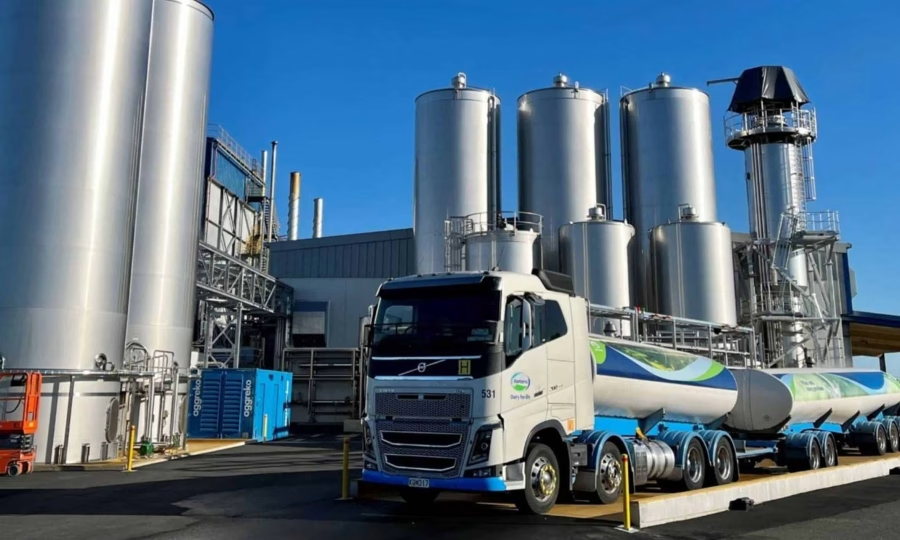How will the Canada rail shutdown affect your dairy farm? Are you ready for the impact? Read more.
Summary: Imagine waking up to find that the lifeline of your dairy farm‘s supply chain is at a standstill. That’s the harsh reality many farmers across North America face today due to a labor dispute shutting down Canada’s two largest railways. CN and CPKC have locked out nearly 9,300 workers, halting freight traffic and putting crucial industries on edge. This disruption threatens to impact a wide range of products, from grains to potash, and with Canada sending about 75% of its exports to the US, mostly by rail, the potential fallout is staggering. Industry and trade organizations warn of an “immediate coast-to-coast impact” and potential damage to Canada’s reputation as a reliable trading partner. An interruption in the supply chain could lead to shortages and increased prices for essential supplies, like feed for dairy production, potentially delaying the receipt of necessary drugs and treatment, jeopardizing herd health.
- Canada’s two largest railways, CN and CPKC, have halted freight traffic due to a labor dispute, affecting 9,300 workers.
- This stoppage impacts a broad range of products, including grains, potash, and chemicals, crucial to various industries.
- About 75% of Canada’s exports to the US are shipped by rail, potentially leading to significant economic repercussions.
- Industry organizations are concerned about immediate nationwide effects and damage to Canada’s trading reputation.
- Dairy farmers could face shortages and price hikes for essential supplies, impacting feed, drugs, and herd health.
- This supply chain disruption threatens the agricultural sector’s productivity and could delay critical shipments.

Imagine learning that your dairy farm’s supply chain is in peril. That is the reality that many Canadian farmers confront as a result of a significant train outage. How may this impact your farm? Continue reading to discover out.
The Clock is Ticking
Nearly 9,300 workers at Canada’s two central railroads, Canadian National Railway (CN) and Canadian Pacific Kansas City (CPKC), have been locked out. This follows months of fruitless discussions with the Teamsters Union. The trains are essential for carrying commodities throughout North America, and a lengthy closure could be disastrous for several businesses, including dairy production.
The Canadian federal government intervened to halt a statewide rail strike that had begun earlier. Ordering binding arbitration between the union and train corporations resulted in dismantling picket lines and CN personnel returning to work.
However, the union intends to strike again next week, disputing the government’s decision. They suggest that demonstrations might continue even with a back-to-work order, disrupting operations.
The labor conflict has an economic effect since CN and CPKC deliver freight across Canada and into the United States. Workers at the railroads were locked out after failed discussions over more excellent salaries and improved working conditions.
While the current strike has been ended owing to government involvement, emotions remain high, and other strikes may occur if the union continues to protest the government’s actions. These potential future strikes could further disrupt the supply chain, leading to more severe shortages and increased prices.
You might wonder, “How does this affect my dairy farm?”
Consider the potential consequences of this shutdown on your dairy farm. Canada’s reliance on rail for commodity transportation, including critical supplies like cereals and feed, means that any disruption could lead to shortages and increased prices. Imagine the impact of a feed shortage on your cows’ nutrition and milk output.
Veterinary supplies are another crucial consideration. A delay in getting necessary drugs and treatment may jeopardize the health of your herd. Let’s remember the equipment. Replacement components for milking machines and refrigeration units are critical to running operations smoothly. A rail closure might cause significant delays or stoppages in obtaining components, placing your milk supply at risk of spoiling or diminished efficiency.
Wade Sobkowich of the Western Grain Elevators Association said that a shutdown just before the autumn harvest would halt practically all grain movement in Canada. This impacts feed grains and other feed additives essential for providing a balanced diet to your cows [source]. Without these, milk output and general herd health may suffer, potentially leading to long-term issues for your farm.
These disturbances may put your farm in a financial dilemma. Increased expenditures from obtaining other feed supplies or emergency veterinary treatment pile up rapidly, and decreased milk output reduces profitability. No dairy farmer wants to confront this situation, emphasizing the need to be aware and prepared.
The $40 Million Daily Gamble: Rail Shutdown Threatens Canada’s Agricultural Exports
According to the Railway Association of Canada, railroads transport half the country’s export commodities yearly, totaling C$380 billion (£214 billion). This comprises a large number of agricultural items that have a direct influence on dairy production. Professor Barry Prentice of the University of Manitoba Transport Institute thinks the government may act with back-to-work legislation if the situation does not improve quickly. This might improve supply chain efficiency for dairy producers.
In 2023, rail transport accounted for 25% of Canada’s agricultural export value to the United States, averaging more than $40 million daily. A protracted halt might significantly impact the farming industry in Canada, where 90% of agricultural goods, such as grains and oilseeds, are transported by rail.
Prime Minister Justin Trudeau has encouraged both parties to continue negotiations. Industry and trade associations fear the interruption may have an immediate and broad effect. The US and Canadian Chambers of Commerce are likewise worried about the potential “devastating” consequences for companies and families.
The Bottom Line
Prepare for the worst while hoping for the best. The railway closure in Canada has far-reaching consequences. For dairy producers, staying informed and prepared is crucial. While the government may step in, having a backup plan is critical to your farm’s success. So, how can you limit the risks? Stay informed about talks and potential government measures. Investigate other supply channels and stock up on supplies if possible. Being proactive can help you navigate through this challenging moment.












